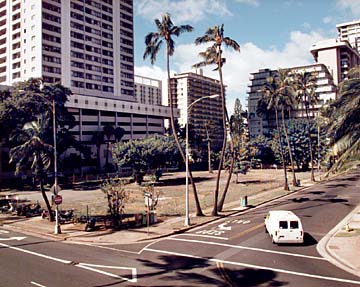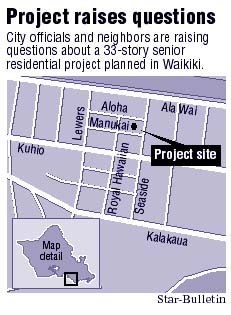


Proposed apartment
for seniors scrutinized
The developer wants many
By Gordon Y.K. Pang
variances; residents and city
officials have open space
and traffic concerns
Star-BulletinCity officials are echoing worries raised by Waikiki residents about a planned 260-unit senior citizen complex on Seaside Avenue.
Seaside Club Senior Living LLC is seeking myriad zoning exemptions for its $45 million Seaside Resort Villas project on one of the largest undeveloped parcels in Waikiki. The 33,407-square-foot plot is bounded by Seaside Avenue, Aloha Drive, Royal Hawaiian Avenue and Manukai Street.
The project was at the center of a recent Waikiki Neighborhood Board meeting. Meanwhile, more than 600 signatures from area residents opposed to the project have been gathered by Bill Sweatt, who lives across from the proposed development. The petition cites density, height, open space and traffic concerns.

Residential developers may be granted some exemptions by the City Council under state law provided they sell or rent at least 50 percent of their units in what the government sets as "affordable housing" prices.The developers of the 33-story Seaside Resort Villas want to put up not only a retirement condominium, but also areas for a restaurant, beauty/barber shop, an assembly area and a resident-only "modest medical facility."
Among the exemptions being sought:
Sweatt said between 3,500 and 4,000 people live, work and play daily in the immediate area surrounding the proposed project.Increased density from an allowable 62,004 square feet of building area to 226,336 square feet.
Deletion of park requirements.
Increased height limit from 280 feet to 313 feet.
Reduction of open space from 50 percent to 33 percent.
Deletion of loading space requirements.
Leased parking space for residents.
"We already have got a whole bunch of people there in that teeny little area," Sweatt said.
Area Councilman Duke Bainum is not hesitant about how he feels about the project.
"It's way out of scale and character in our community and flies in the face of having a Hawaiian sense of place and I will do everything I can to defeat this project as currently advocated," Bainum said.
"This is the wrong project in the wrong location because it's at the wrong scale," he said, noting that the plan calls for more than three times allowable density.
The statute allowing for exemptions was designed to fast-track affordable housing units, Bainum said, but "we don't have the same urgency of affordable housing as we did to sacrifice good planning and health and safety concerns."
Jan Sullivan, city director of Planning and Permitting, said her agency is still reviewing the plan for Seaside Resort Villas.
"They are asking for a lot of exemptions," Sullivan said. "We have a lot of concerns about the project and that's why we have been looking at it closely."
Sullivan's department must determine whether an environmental assessment needs to be filed by the developer before the request for exemptions is forwarded to the Council.
Among her major concerns are the easing of restrictions pertaining to density, height, open space and park dedication, she said.
Affordability also appears to be a question mark, Sullivan said.
A pro forma feasibility study by the developer says 256 units are to be sold at an average price of $179,900 each and four penthouse units at $336,500.
Meanwhile, a spokesman suggested that the average price of units would be about $175,000.
Planning officials said developers have not given detailed information showing that they can satisfy the affordability requirement.
Bainum also raised questions about the Waikiki Neighborhood Board's support for the project. The board voted 13-0 in July to endorse the project after a presentation by developer representatives.
But following criticism at last week's meeting, a vote was cast to rescind the endorsement. Despite an 8-3 vote, the vote was defeated because nine votes were needed to approve it.
"The neighborhood board needs to explain why it endorsed such a large and ill-conceived project so early," Bainum said.
Tom Brower is among the neighborhood board members who initially voted to endorse the project but now want to oppose it.
"The reason we endorsed it originally was because there was no showing of residents against it," Brower said. That changed as the weeks went by, said Brower, who is also president of the Waikiki Residents Association.